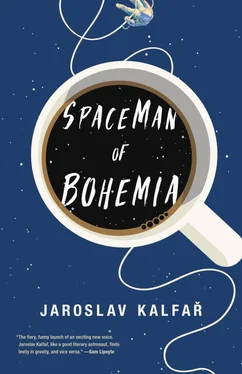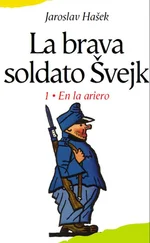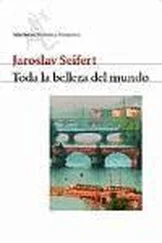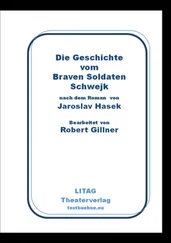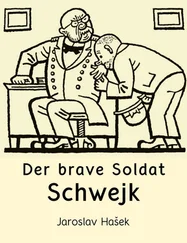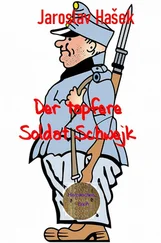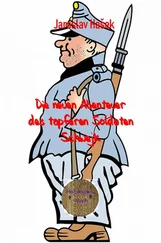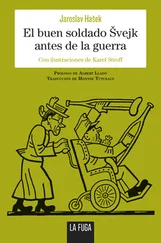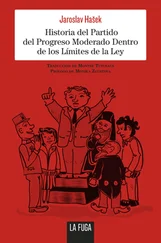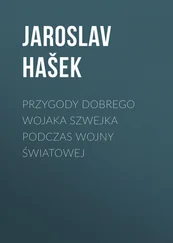I reached out my hand, one finger pointed. I could still turn back. Ideas, science, a future for the country, Tůma had said. What if I catch an extraterrestrial for you, senator? Will it inspire the national pride you hoped for? It could not be real. The lips, smoker’s teeth, eyes, lack of genitals—what things could Kuřák’s Freudian analysis reveal about this mosaic of my imagination? Yes, my mother had full lips, part of her movie star appeal. Yes, my father’s teeth were often yellow. More likely, I would bring Tůma a new patient for Bohnice, Prague’s finest establishment for the insane.
I touched the creature’s leg, felt the motel carpet roughness of each individual hair, the steel solidity of bone underneath, the dry skin pulsing gently.
It was there. It was.
“You are here,” I said.
“I am,” it said.
I let go of the creature’s leg and thrust myself backwards, pulling wildly on the wall handles.
“I wish I had the capacity to assist with your emotional distress, skinny human. I cannot offer you the solace of Nutella, for I have consumed it.”
I needed to think, to digest, I needed a distraction from this touch. I left the creature and returned to the lab, where I inventoried old samples, manically trashed my logs and created brand-new ones, polished the glass, and reorganized the items strapped to my table: a lamp, sticky notes, silver pens, a notebook.
I hid in the lab for two hours. When I returned to the corridors, I heard a low snore. In the Lounge, the creature floated in the upper corner, all of its eyes closed, legs folded underneath its belly, forming a nearly perfect sphere. I knew what needed to be done.
I recovered a scalpel from the lab. What is a scientist to do when faced with impossible possibilities? A scientist gathers data and studies it in accordance with the scientific method. I pondered whether I could risk carving out a skin sample, or perhaps a scrape, and quickly come back to the lab before the creature realized what was happening. There was the safer option of collecting hair only. This was the way. If I put an item under the microscope and found real particles, I could be sure. Particles do not lie. Elements are truth tellers. For a moment, I considered simply plunging the scalpel into the creature’s belly, spilling whatever insides it held all over the ship—there couldn’t be more tangible proof than that. With an intense headache and shaking fingers, side effects of the sleep medication, I approached the alien creature, counted its exhales. I lifted the knife, deciding to go with the sound option of gathering hair.
With its eyes still closed, the creature said, “I would not follow your intentions here, skinny human.”
I flinched. The sentence was a pure growl.
The eyes opened. Its legs did not move.
My eyelids pulsated, I couldn’t swallow. There had to be a way. Something I could place underneath a microscope to affirm or refute my senses. At that moment, it seemed more important than stealing fire from Olympus or splitting the atom. What I did was inevitable.
I plunged the blade forward, toward the creature’s back.
It caught the scalpel with one of its legs, while three others wrapped around my body. We flew upwards at a staggering speed, and it pressed its full weight against my chest, stomach, and groin. The pressure of the legs was like a trio of wandering snakes; I could not move a single body part below the neck.
“You refuse to be my subject, yet you subject me,” the creature said. There seemed to be no anger, only a statement of fact. The scalpel flew toward the Lounge window.
“I’m sorry. I didn’t want to hurt you.”
“This I know, skinny human. But the body must not be violated. This is the greatest truth of the universe.”
“You know this has been… unexpected. I have to know if you’re here.”
“Imagine my wonder when I discovered Earth,” it said.
“It can’t compare to all the other things you have seen.”
It was silent.
“Give me a skin sample. A small one. So I can be sure. We can be subject to each other. Do you have a name? Something I can call you?”
More silence. Its grip loosened. The belly was warm, spread over me like a water bed mattress.
“Perhaps this was a mistake,” the creature said. “Yes, I am certain of it.” It let go of my torso and swiftly made its way through the corridors.
“It wasn’t,” I said. “Stay here.”
I pulled myself forward on the railings, but I could not match the creature’s speed. Soon it vanished out of sight. I looked inside the lab, my bunk, the kitchen, the bathroom, every corner of the Lounge. I shouted, pleaded for it to return. I promised to give it whatever it needed. I promised I would never consider violating it again. I promised it was simply too important.
There was no response.
Hours later, when I finally crawled inside the Womb and dimmed the lights, dripping twice the recommended dose of Sladké Sny onto my tongue, I again felt the pressure around my temples, witnessed an array of colored stains in my vision. My jaw ached from the infected molar. The creature probed on then, despite its absence. It was looking for a specific day. The day a stranger appeared in my life carrying an artifact belonging to my father. An iron shoe.
TWO DAYS AFTER my thirteenth birthday, I am bedridden with fever and stomachaches. Grandma checks on me every few hours as I read Robinson Crusoe and puke into the bucket usually used for pig blood. It is a rainy summer, and through the window I can see Grandpa, cursing the sky and squishing his boots in the mud as he stuffs hay inside the rabbit cages. Water captured by the gutters travels to a small tub from which Grandma draws to hydrate the houseplants. The chickens are sleeping inside the coop, their claws grasping at the wooden poles that serve as their beds. From the rooftop of the house, two black cats fall into the mud, hissing and screaming. I am not sure whether they are killing each other or mating, and I’m not sure whether the difference matters.
In my sweat I have lost track of days, unsure whether it is Sunday or Thursday, when a blue Nissan pulls up to our gate. A suited man exits the car, straightens out the creases in his jacket, and takes a purple backpack out of his trunk. His knock carries through the cold hallway. Grandma talks to him by the front door. I walk out of my room and try to hear their whispers.
“Go to sleep,” Grandma says to me.
“So this is the boy,” the stranger says. He speaks from the corner of his mouth, and despite the deep pox scars on his cheeks, he has the look of a movie actor—a defined jaw covered in stubble, his eyes cold, his hair slicked but not greasy.
Grandpa walks in from the yard, a cigarette between his teeth, a chunk of bulgur in his hand. He listens to the man.
“Jakub, bed,” Grandpa says. He gestures for the stranger to follow him into the living room and shuts the door behind him. I count to sixty and walk over to the door. I slowly take the key out of its hole and peep through. Grandpa sits with a beer, while the stranger puts his wet backpack on the table and pulls out a rusty metal shoe, so large it could only fit a proper giant. Grandma waters her plants, her back turned to the men.
“Like I said, I was once, in a very specific way, closely tied to your son,” the man says. “When we first met, he introduced me to the shoe you see on your table. He took me to an interrogation room in the secret police headquarters and he asked if I liked poetry.”
“I will offer you a beer if you take your wet belongings off of my wife’s table,” Grandpa says.
“I apologize,” the stranger says but keeps the shoe where it is. “I told him that I dabbled. I enjoyed the classics, like any other university student. William Blake, is what I told your son. He asked whether I wrote poetry too.”
Читать дальше
